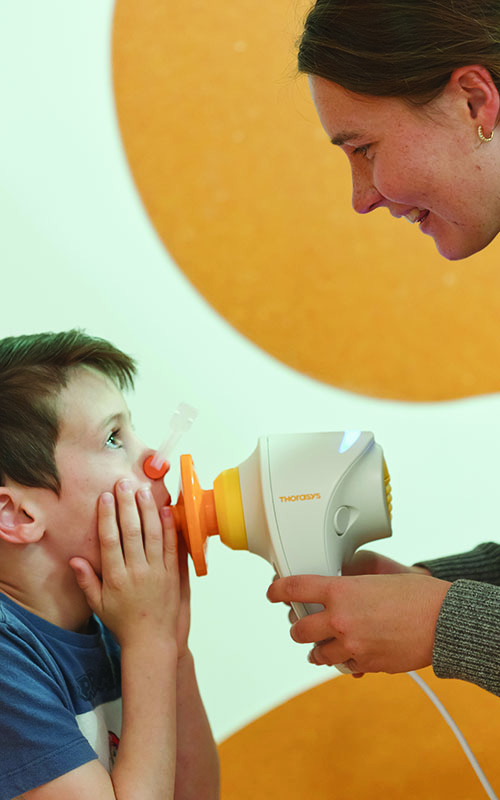
Pictured: Research Assistant Tiffany Bradshaw helps seven year old Pierce Brazier undertake a lung function test. Pierce and his twin brother Aston were born premature
A new study is helping to identify treatment options to improve the lung function of babies born prematurely after it was determined survivors of preterm birth were at risk of declining lung health – debunking a long-held belief that they would grow out of their breathing problems.
Associate Professor Shannon Simpson, cohead of Children’s Lung Health at the Wal-yan Respiratory Research Centre, led a ground-breaking, decade-long study which five years ago found preterm babies’ lung function was at risk of worsening. This meant damage to the children’s lungs was ongoing and needed treatment.
Determined to improve the lung health of these children, Associate Professor Simpson and the Children’s Lung Health team secured funding for a new trial exploring the effectiveness of common asthma medication fluticasone, or ‘Flixotide’, in treating ongoing breathing problems in children aged six to 12 years-old, who had been born at less than 32 weeks’ gestation. The Preterm Paediatric Inhaled CorticoSteroid Intervention (PICSI) study began in 2018 and, after more than three years of seeing families, the study team recruited its final participant in early 2022.
Throughout the study the team followed 87 children who were given the inhaled medication and another 83 who received a placebo. All participants undertook a baseline visit consisting of a lung health questionnaire, lung function testing, and the collection of biological samples.
They then took either Flixotide or a placebo twice daily for 12 weeks, before being followed up to assess any changes in their lung function. The study results showed children born prematurely who were treated with fluticasone over the 12 weeks experienced a modest improvement in lung function, with nearly one quarter (23 per cent) experiencing a significant improvement in their lung function. This suggested there is likely to be a subset of individuals born preterm for whom the treatment could be very effective.
Associate Professor Simpson said the results were significant and would help to guide the longterm clinical management of people who had prematurity associated lung disease.
More than 15 million babies are born preterm each year, with over two million babies being delivered very preterm, at less than 32 weeks gestation. Most babies born before 32 weeks need help with breathing because their lungs are not fully developed.
“We also know that those very preterm infants surviving the neonatal period are at risk of significant lung disease throughout life. “After these babies leave the NICU, there’s not currently a coordinated approach to long-term lung health follow-up, or any evidence-based treatments for those babies that are at risk of deteriorating lung function.
“Our research within the Children’s Lung Health team focuses on working out how we can intervene as early as possible to make sure these kids grow up with healthier lungs. And for the first time, we now have an evidence-based treatment that has been shown to significantly improve the lung function of a group of these kids in the short term.
“Our aim now is to build on this work, so that we can identify treatment methods to improve the management of lung disease of those born preterm, allowing them to breathe easy, and live their biggest lives.”
Next steps
Further studies are needed to determine how to predict which kids will benefit the most from this intervention, and to trial fluticasone for a longer period of time to determine if extended use prevents lung function decline in this population.
Did you know?
- Globally, more than two million babies are born at less than 32 weeks’ gestation every year
- Significant improvements in neonatal critical care throughout the 1990s drastically increased the survival rate of infants in this category
- Rates of preterm birth have increased in almost all countries over the past 20 years, including Australia, and now account for more than 11 per cent of births globally
- Bronchopulmonary dysplasia (BPD) – a chronic lung disease of prematurity - remains one of the most significant complications
